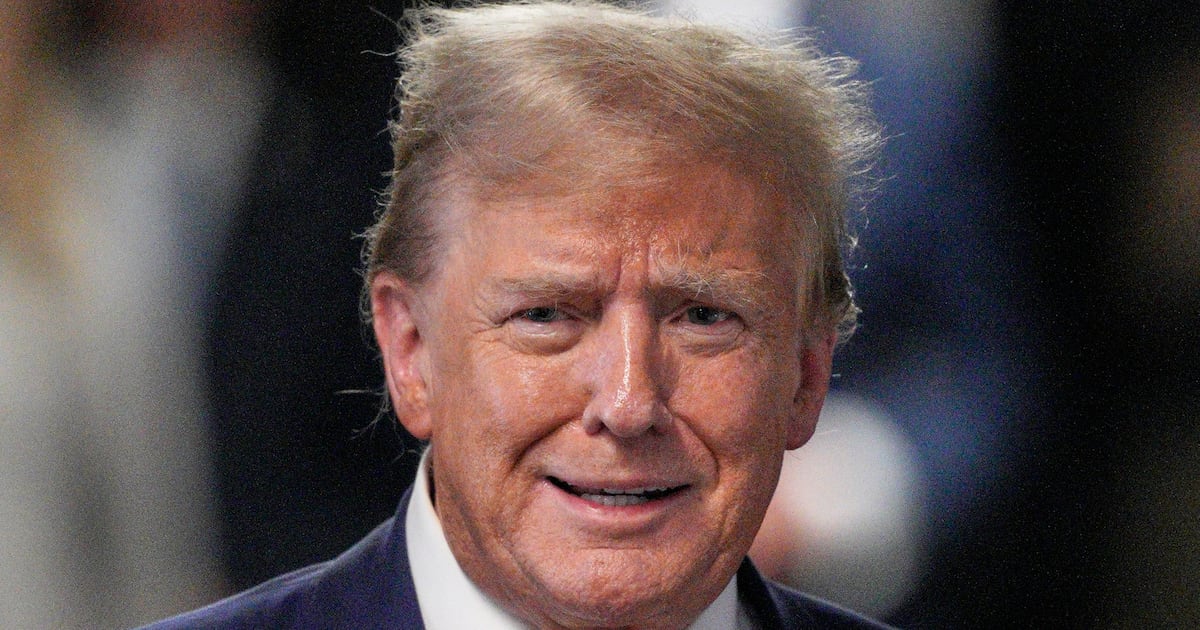The walls keep closing in around Donald Trump in Atlanta, where a third person involved in his 2020 coup efforts flipped on his former boss on Friday—this time, an attorney for the former president who outlined a plan to recruit fake electors to hijack the nation’s voting system.
The last-minute guilty plea by Kenneth Chesebro came just as his trial—the first in Fulton County District Attorney Fani Willis’ overarching mob takedown case—was about to get underway with jury selection. Chesebro authored several legal memos laying out how Republicans would ultimately create an alternate slate of electors who would override Georgia voters’ decision to go with now-President Joe Biden.
Willis charged Chesebro with seven criminal counts, including violation of the state’s racketeering laws, conspiracy to commit impersonating a public officer, and conspiracy to commit forgery.
In an Atlanta courtroom on Friday, he agreed to plead guilty to just one felony—conspiracy to file false documents—in exchange for having the remaining charges dropped. Under the plea deal, he also avoided jail time and was instead ordered to serve five years of probation, pay $5,000 in restitution, complete 100 hours of community service, and submit an apology letter to the people of Georgia. He must also testify truthfully at future court proceedings against the remaining co-defendants in the case.
Chesebro already wrote the apology letter, which was turned over to the judge. And he came clean during a recorded tell-all session with prosecutors called a “proffer” earlier on Friday morning. He promised to turn over all other damning emails and texts that would incriminate his fellow MAGA associates who took part in the overall plot to keep Trump in the White House after losing the presidential election.
Chesebro, who had suffered a string of legal losses in the early stages of his case, appeared relieved as he spoke to the judge midday Friday.
“I just want to thank you for the way you’ve handled these proceedings,” he said.
"Well, I appreciate that, Mr. Chesebro, but we’re not done yet. I’ve still got some special conditions,” Judge Scott McAfee responded, listing all the rules the disgraced attorney must abide by.
On Thursday, fellow Trump attorney Sidney Powell, who was set to go to trial with Chesebro on Friday, took a similar plea deal and agreed to testify against her co-defendants. Bail bondsman Scott Hall, who was involved in a breach of voting machines in rural Coffee County, also pleaded guilty earlier this month.
Chesebro’s decision to wait until the day of a trial before joining the DA’s side hints at how effectively Willis has managed to turn Trump’s own lieutenants against him. Three of the 19 defendants accused of essentially running a criminal enterprise have now promised to become state witnesses, and prosecutors will use their testimony to detail exactly how the election coup efforts proceeded.
The nation got something of a preview during the dozen or so House Jan. 6 Committee hearings last year, a political inquiry that portrayed Trump as a wannabe despot during his final days in office—but one that lacked criminal punishment and mostly relied on insiders weighed down by their heavy consciences.
By contrast, Willis has managed to use the threat of significant prison time to turn other insiders into willing participants in Trump’s legal demise. And Chesebro’s involvement went all the way to the top.
The indictment claimed that Chesebro worked alongside Trump and some of the brains behind the attempted coup: ex-Trump lawyer Rudy Giuliani, who spread conspiracy theories in official state proceedings; John Eastman, a conservative lawyer who engineered the plan to have loyal Republicans halt congressional certification of Biden’s win; and Michael Roman, a political operative accused of hooking up the Trump campaign with state legislators to run a parallel and illegitimate electoral college vote.
Chesebro had asserted that he was simply suggesting legal options to the Trump campaign but a Wednesday report from The New York Times revealed that he admitted in emails that his plan was politically useful in giving Americans “the impression that the courts lacked the courage to fairly and timely consider these complaints, and justifying a political argument on Jan. 6 that none of the electoral votes from the states with regard to which the judicial process has failed should be counted.”
Until Friday, he was ready to proceed alone by breaking off his case from that of his fellow co-defendants—a huge gamble that could have revealed any weaknesses in the DA’s case and given Trump and other high-level officials a roadmap for a better defense. However, now that this trial is no more, the American public is in for a potentially long wait. Although the DA has said she wants to put Trump and his remaining associates on trial as soon as possible—which could be just a few months away—the sheer size of the case might delay any trial until late next year, or even past the 2024 election.
Then again, the extra time could incentivize others in Trump’s circle to flip as well.









